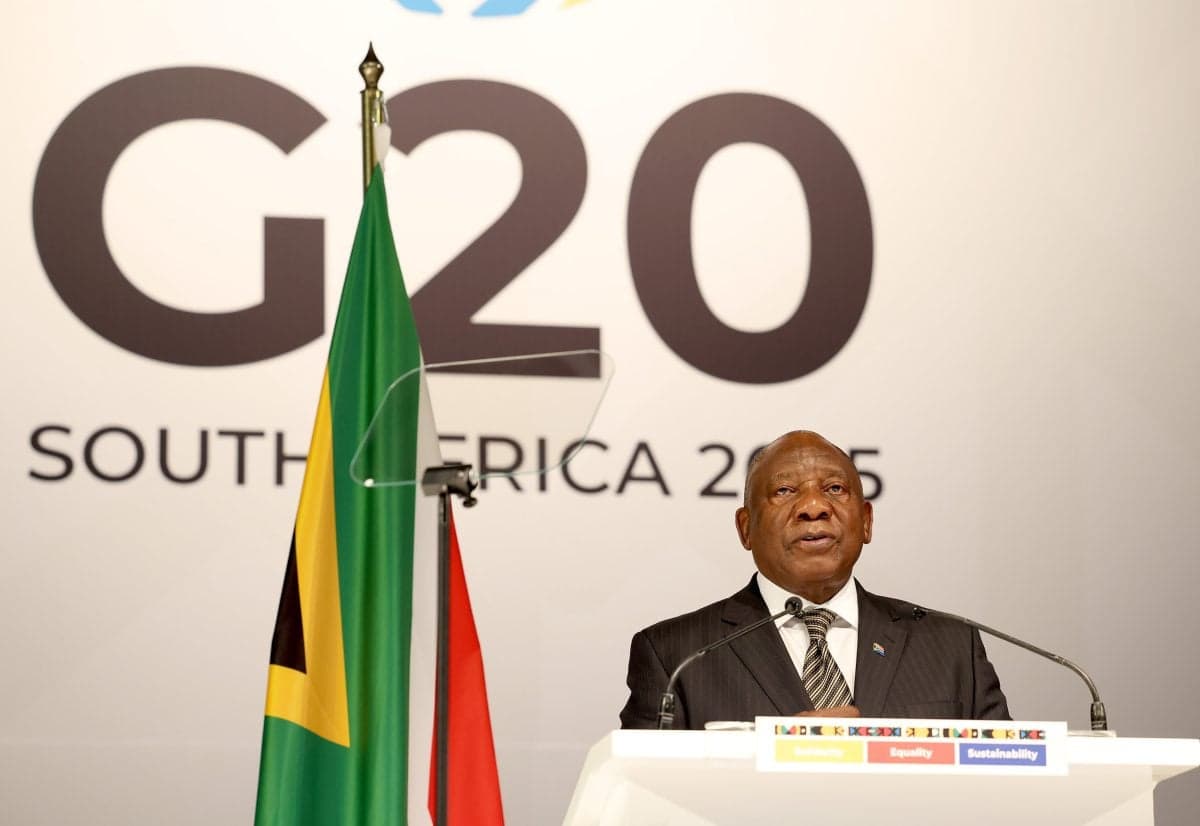We're loading the full news article for you. This includes the article content, images, author information, and related articles.
With Donald Trump boycotting the first G20 summit on African soil, host South Africa, backed by a vocal Kenyan civil society, is leveraging the vacuum to champion a new deal on global finance, debt relief, and climate justice for the Global South.

JOHANNESBURG, SOUTH AFRICA – The Group of Twenty (G20) summit convenes in Johannesburg this weekend, Saturday, 22 November, and Sunday, 23 November 2025, marking a historic first for the African continent. However, the gathering is overshadowed by the conspicuous absence of United States President Donald Trump, who announced on 5 November that no American officials would attend, citing discredited claims of human rights abuses in South Africa. This decision creates a significant power vacuum, providing an unprecedented opportunity for African leaders and civil society to steer the global agenda towards the continent''s most pressing economic challenges.
South African President Cyril Ramaphosa has dismissed the boycott, stating on 14 November, "their absence is their loss," and affirming the summit will proceed with making "fundamental decisions." Ramaphosa''s administration is championing an agenda themed "Solidarity, Equality, Sustainability," focusing on multilateralism, sustainable debt relief for low-income nations, fairer terms for critical mineral producers, and financing for climate-induced disaster readiness. This Africa-centric platform is amplified by the African Union''s recent inclusion as a permanent G20 member, a move intended to give the continent a stronger voice in shaping global economic policy.
The outcomes of the Johannesburg summit carry direct and significant implications for Kenya and the wider East Africa region. Kenyan civil society organizations, led by the Fight Inequality Alliance (FIA) Kenya, have been vocal in their demands for systemic economic reforms. Ahead of the summit, FIA Kenya convened "People''s Assemblies" in Nairobi, Vihiga, Kakamega, and Kiambu, culminating in a declaration that calls for debt justice, fair taxation, and robust climate finance.
These demands are rooted in Kenya''s challenging economic reality. The country''s national debt has surged to KSh 11.81 trillion, approximately 67.8% of its Gross Domestic Product (GDP), with debt servicing costs consuming over half of government revenue—more than is allocated to essential public services like health and education. "The G20 continues to operate within an economic framework that deepens inequality rather than confronting it," stated Brenda Osoro, National Coordinator of FIA Kenya, during a media briefing on Thursday, 13 November 2025. The alliance is urging G20 leaders to support the cancellation or significant restructuring of what it terms unsustainable debt.
Historically, Kenya has had a complex relationship with G20 debt relief initiatives. In 2020, during the COVID-19 pandemic, Kenya initially hesitated to join the G20''s Debt Service Suspension Initiative (DSSI), citing concerns over restrictive terms and potential impacts on its credit rating, before later seeking to defer payments.
President Trump''s absence has opened the door for other global powers, particularly China and the European Union, to expand their influence. China, represented by Premier Li Qiang, is expected to position itself as a leader of the Global South, advocating for reforms to the global governance system and promoting its Belt and Road Initiative. Beijing has already signaled its support for South Africa''s agenda, emphasizing solidarity and sustainable development. For Kenya, China is a critical partner and its largest bilateral lender, having financed major infrastructure projects like the Standard Gauge Railway. The summit provides a platform for China to deepen these economic ties across the continent.
The European Union, represented by Commission President Ursula von der Leyen and Council President António Costa, also sees an opportunity to strengthen its partnerships. The EU''s agenda aligns with several of South Africa''s priorities, including climate finance and the green transition. This is particularly relevant for Kenya, which signed an ambitious Economic Partnership Agreement (EPA) with the EU in December 2023, focused on sustainability and trade. The EU''s Global Gateway initiative is positioned as a key vehicle for investment in African infrastructure, including green energy projects like Kenya''s Olkaria geothermal plants.
A key focus of the summit is the establishment of a G20 Critical Minerals Framework, aimed at ensuring that resource-rich African nations benefit more equitably from the global energy transition. Africa holds approximately 30% of the world''s critical mineral reserves, which are essential for technologies like electric vehicle batteries and solar panels. The framework advocates for developing value chains and processing facilities within Africa, a move that could significantly impact Kenya''s own ambitions to develop its nascent mining sector. The Kenyan government has already classified minerals like lithium and cobalt as strategic, aligning with the G20''s focus.
The summit also offers a forum to address long-standing trade issues, including the uncertain future of the African Growth and Opportunity Act (AGOA) with the United States. Analysts suggest that with the AU at the table, African nations can collectively push for more stable and predictable trade agreements that are insulated from the shifting political winds of developed nations.
As the summit concludes on Sunday, 23 November, President Ramaphosa is expected to symbolically hand over the G20 presidency to the United States, which will host in 2026. The gesture, potentially made to an empty chair, will underscore a pivotal moment where Africa, despite the snub from the world''s largest economy, has firmly placed its development, debt, and climate priorities at the center of the global stage. The long-term impact will depend on whether the solidarity expressed in Johannesburg translates into concrete financial and policy commitments for nations like Kenya.
Keep the conversation in one place—threads here stay linked to the story and in the forums.
Sign in to start a discussion
Start a conversation about this story and keep it linked here.
Other hot threads
E-sports and Gaming Community in Kenya
Active 9 months ago
The Role of Technology in Modern Agriculture (AgriTech)
Active 9 months ago
Popular Recreational Activities Across Counties
Active 9 months ago
Investing in Youth Sports Development Programs
Active 9 months ago
Key figures and persons of interest featured in this article